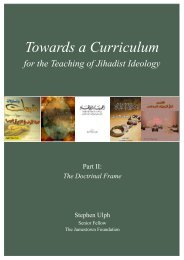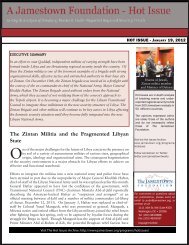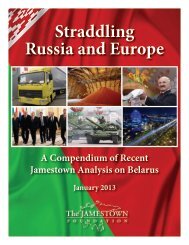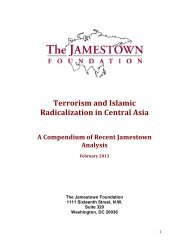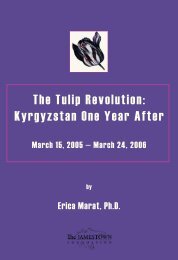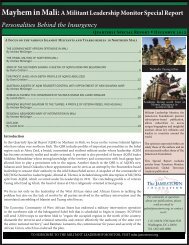ChinaBrief In a Fortnight - The Jamestown Foundation
ChinaBrief In a Fortnight - The Jamestown Foundation
ChinaBrief In a Fortnight - The Jamestown Foundation
You also want an ePaper? Increase the reach of your titles
YUMPU automatically turns print PDFs into web optimized ePapers that Google loves.
<strong>ChinaBrief</strong> Volume XII s Issue 21 s November 6, 2012<br />
promises to label China as a currency manipulator the<br />
first day he is in office has received a lot of coverage. By<br />
and large, Mr. Romney has been cited as sounding rather<br />
vociferous when it comes to China’s trade and economic<br />
practices with some mentioning “Romney’s willful<br />
attacks on China…” (Xinhua, October 17). But what is<br />
more interesting is that some of the candidate’s doublespeak,<br />
or change of position, has also been brought to<br />
light. For example, Mitt Romney visited China back in<br />
2006 while still governor of Massachusetts and, at that<br />
time, made several statements about how the United<br />
States should seek cooperation with China based on free<br />
trade principles and how he admired the Chinese for<br />
their strong work ethic (People’s Daily, November 8, 2011).<br />
Certain Chinese feel this is a far cry from the China policy<br />
that is outlined on his official campaign website which<br />
could be considered “an outdated manifestation of a Cold<br />
War mentality” (China Daily, August 27). <strong>The</strong>se changes<br />
in tune or “capriciousness” have been “attributed to the<br />
deeply rooted bad habits of the U.S. political nature. <strong>The</strong><br />
United States is a country that needs to find rivals at any<br />
time and everywhere” (People’s Daily, November 8, 2011).<br />
<strong>In</strong> other words, the strident language used by presidential<br />
candidates is seen more as a manifestation of the flaws in<br />
the American political tradition, rather than expressions<br />
of a candidate’s actual beliefs.<br />
President Barack Obama is not immune to this sort of<br />
criticism either. For example, some have made note of<br />
his “strong moves against China, including imposing<br />
high tariffs on Chinese products, rejecting Chinese<br />
companies’ investment in the United States, and filing<br />
trade cases with the World Trade Organization against<br />
Chinese companies” (Guangzhou Daily, October 18). <strong>In</strong><br />
China, there also seems to be an understanding that<br />
most incumbent presidents, including Obama, engage<br />
in credit-claiming. Several jabs have been made about<br />
how President Obama used the debates as a platform to<br />
demonstrate his “success” in getting the Chinese yuan<br />
to appreciate “because we have pushed them hard...”<br />
(Xinhua, October 17).<br />
President Obama and Mitt Romney, thus, are both seen<br />
as focusing more on “partisan self-interest” rather than<br />
on the potential adverse affects their rhetoric may have<br />
on the U.S.-China relationship, writ large (Hexun, July<br />
11).<br />
6<br />
<strong>The</strong> Pendulum Always Swings Back to the Middle<br />
<strong>The</strong> other point that gets emphasized is that no matter<br />
which party or president is in power, the U.S.-China<br />
relationship has been fairly consistent (with some rough<br />
patches now and again) since the two countries ushered<br />
in a new era of diplomatic relations forty years ago.<br />
As Xie Tao wrote, “…from Richard Nixon to Barack<br />
Obama, the dominant trend of U.S. China policy has<br />
been one of remarkable continuity. Barring extraordinary<br />
circumstances, if there was any noticeable change at all, it<br />
was often more of fine-tuning than a bolt of lightning”<br />
(China Daily, April 27). Consequently, even though there<br />
is a tradition of the opposition candidate campaigning<br />
for president by underscoring the incumbent’s so-called<br />
“weakness” on China— few seem concerned that this<br />
will translate into actual pugnacity once in the Oval<br />
Office. For instance, when Clinton was running for office,<br />
he attacked George H.W. Bush as being too weak on<br />
China; and when George W. Bush was on the campaign<br />
trail, he used the same rhetoric to describe the Clinton<br />
administration. Obama used the word “coward” when<br />
describing some of the latter Bush’s China policies, and<br />
today Romney is using the same tactics against Obama<br />
(Beijing News, July 31). It should then come as no surprise<br />
that China does not dissect each and every utterance<br />
made by an U.S. presidential candidate with a fine-toothed<br />
comb. After all, “No matter who wins the election, every<br />
U.S. president… attaches great importance to the China-<br />
U.S. relations. <strong>In</strong> other words, China-bashing is nothing<br />
but a topic which aims to attract the public attention”<br />
(Chinamil.com.cn, October 24).<br />
On the other hand, though Chinese observers of U.S.<br />
politics might appear analytically complacent when<br />
it comes to the presidential elections, this should not<br />
imply that they do not closely follow the policies and<br />
pronouncements that come out of the White House.<br />
One such case in point is the U.S. “pivot” or “re-balance”<br />
to Asia. Though some here in the United States might<br />
dismiss this strategy as more slogan than substance at this<br />
point, Chinese analysts have paid very close attention to<br />
nearly every official and semi-official statement on the<br />
topic. Some remark that the U.S. strategic rebalancing to<br />
Asia has damaged trust and urge the U.S. to “… make<br />
its strategic rebalancing less provocative…” and that<br />
no matter which candidate wins the election, how they<br />
handle relations with China and how they work to build




